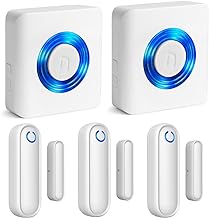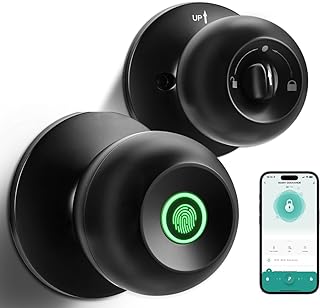5 important factors worth considering when looking for the best door alarm for dementia patients
The most important thing for caregivers and loved ones is keeping dementia patients safe and secure. When looking to buy a door alarm for someone with dementia, there are important things to consider. These include how easy it is to use, how reliable it is, and if it can be customized. The sound levels are also important to think about. Having the right door alarm can really help improve the safety of individuals with dementia. By looking at these key factors, you can select a door alarm system that will give you peace of mind and keep your loved ones safe and independent.
See our guide to the best door alarm for dementia patients.
Loud volume
When choosing a door alarm for people with dementia, it’s important to consider how loud it is. While a loud alarm may seem like the best way to get help quickly in an emergency, it can also be distressing for someone with dementia. It’s important to find a balance between a loud alarm that alerts caregivers and medical professionals and one that doesn’t cause unnecessary stress for the person with dementia.
It’s important to think about how a loud alarm can affect the mental and emotional well-being of someone with dementia. Constant exposure to loud noises can make them feel more anxious, confused, and agitated, which can make their symptoms worse. When choosing a door alarm, it’s important to consider factors like how loud it is, what kind of sound it makes, how long it goes off for, and whether it can be adjusted.
Choosing a door alarm that is effective but also gentle on the senses can help create a calm and comfortable environment for someone with dementia. This can help promote feelings of safety and security while also reducing distress.
Easy to install and operate
Choosing a door alarm for dementia patients that is easy to install and use can greatly improve their safety and well-being. Caring for someone with dementia can be difficult, so having a simple door alarm system can give both the person with dementia and their caregiver peace of mind. Easy installation means the device can be set up quickly and without the need for professional help, and easy operation allows it to fit seamlessly into daily routines.
When looking for a door alarm for dementia patients, it’s important to prioritize simplicity and convenience. An easy-to-use system not only makes the alarm more effective, but also reduces stress and confusion for the person with dementia. By simplifying the installation and operation, caregivers can focus on providing care instead of dealing with complicated technology. Overall, investing in a user-friendly door alarm for dementia patients helps create a safe environment that promotes independence and peace of mind for everyone involved.
Adjustable sensitivity
When thinking about buying a door alarm for people with dementia, it’s important to consider if it has adjustable sensitivity. Being able to adjust how sensitive the alarm is can help customize safety measures without sacrificing freedom or comfort. By personalizing this feature based on the person’s needs and behaviors, caregivers can find a balance between security and independence. Additionally, being able to change the sensitivity of the alarm as the person’s condition changes can provide a sense of control and comfort for both the caregiver and the patient.
In dementia care, where things can be unpredictable, being able to adjust the sensitivity of a door alarm can make a big difference. It caters to the specific needs of each individual and recognizes the varying stages of dementia. This feature allows caregivers to set boundaries that consider the person’s movements and routines, improving safety without using a one-size-fits-all approach. Incorporating adjustable sensitivity in door alarms for dementia patients shows a dedication to respecting individuality and dignity in caregiving, promoting a more comprehensive and compassionate approach to dementia care.
Long battery life
When choosing a door alarm system for dementia patients, it’s essential to prioritize long battery life. This ensures that individuals with dementia feel secure and provides peace of mind. A door alarm with a extended battery life is crucial for continuous protection and reassurance.
Imagine the stress and potential dangers of a door alarm system with a short-lived battery that requires frequent replacement or recharging. It’s not just about having an alarm, but ensuring it works consistently to protect dementia patients and their caregivers.
Investing in a door alarm system with a long battery life demonstrates a commitment to sustainability in dementia care. This feature reduces the need for frequent battery changes, allowing caregivers to focus on providing quality support. It also shows understanding and empathy for the challenges faced by dementia patients, providing a reliable and stable living environment.
By choosing a door alarm system with extended battery life, caregivers and families enhance safety measures and show respect for the well-being of individuals with dementia. This proactive approach supports autonomy and overall quality of life for those living with dementia.
Remote monitoring capability
When considering buying a door alarm for dementia patients, remote monitoring is a crucial feature to have. It allows caregivers to check the status of the alarm from afar, giving them peace of mind even when they’re not with their loved ones. With remote monitoring, caregivers get instant notifications on their phones when the alarm goes off, so they can act quickly to make sure the dementia patient is safe.
Remote monitoring also makes caregiving more convenient and flexible. Caregivers can keep an eye on the alarm no matter where they are, giving them the freedom to do other things without constantly worrying about their loved one’s safety. This extra oversight not only makes caregiving more efficient but also helps both the dementia patient and the caregiver feel more secure and well-cared for.
Conclusion
In the world of caring for people with dementia, using door alarms is an important way to keep them safe while still allowing them some freedom. These alarms give caregivers peace of mind and let those with dementia move around more freely and independently. By combining safety with autonomy, door alarms create a better and more respectful environment for everyone involved in caregiving.

